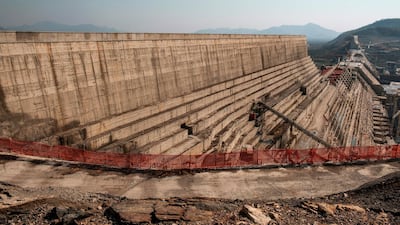For the past decade, Africa’s largest dam project has created rancour between Ethiopia, Sudan and Egypt. Talks for the Grand Ethiopian Renaissance Dam remain deadlocked, feeding the possibility of conflict over scarcity in the arid region.
Over the years, the dam has become an Ethiopian national symbol of successes to come, and one on which Addis Ababa has pinned ambitious hopes of becoming a prosperous country.
The government says that the hydroelectric energy produced by the plant will provide for its own energy needs, creating jobs and business prospects, while surplus electricity can be sold to its neighbours. But dreams of a prosperous and energy-sufficient East Africa are clouded by unresolved disputes over the fairest way to tap into the Nile’s resources.
Leaders of Egypt, Ethiopia and Sudan, the three countries impacted by the dam, plan to hold a virtual summit on Tuesday to once again try to resolve their differences.
But the clock is ticking on the three nations to find a solution. The Renaissance Dam is meant to be completed in 2022, with the initial water filling commencing this month. Cairo And Addis Ababa have been embroiled in tough diplomacy for months without a resolution, leading experts to fear that a water war may be looming over the region.
Sudan and Egypt both reject the launching of the project before all three countries reach an understanding. This could set a dangerous precedent for Ethiopia, which plans on building several other dams. If the project goes as planned, Egypt, which depend on the Nile for 90 per cent of its water needs, may become water insecure. Cairo is set to lose 22 per cent of the Nile’s water flow, potentially turning up to a third of its fields into a desert wasteland. This is a legitimate concern for a country with a population of 100 million to feed. Egyptian leadership also believes that Addis Ababa has not developed a contingency plan in case of droughts – a possibility that would cut $1.8 billion (Dh6.61bn) out of Egypt’s economic production. Khartoum, on the other hand, is looking forward to obtaining affordable electricity, but concerned about catastrophic floods in case there are breaches in the dam, which is situated close to the Sudanese border.
Countries cannot escape their geography or their neighbours. They have a duty to work together to defuse tensions, lest their people pay the price of escalation. Egypt and Sudan have placed their concerns before Ethiopia. These include reasonable goals such as deciding who arbitrates disputes between the three countries, and for Ethiopia to lay out the potential water losses that the dam may inflict upon its neighbours.
Cairo has also asked Ethiopia for access to 40 billion cubic metres of water per year once the first stage of the dam is complete. The three countries may disagree on the details of one another’s concerns but the matter is too important to be left unresolved or for unilateral measures to be forced.
If planned in accordance with Ethiopia’s neighbours and with all potential risks factored into the project, the Renaissance dam could be a great boon for the region. If, however, negotiations fail, the project may indefinitely become an apple of discord, dividing nations that ought to come together and turning an opportunity for growth into a crisis.

